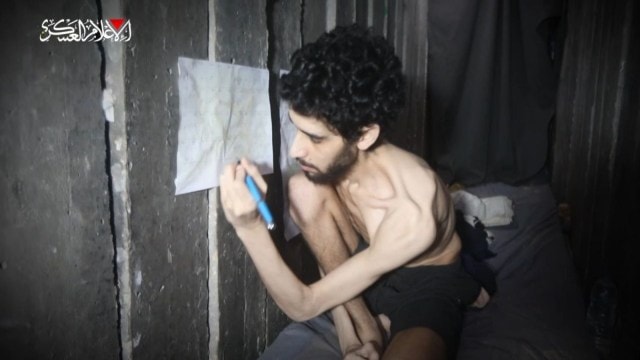Stay updated with the latest - Click here to follow us on Instagram
‘Digging my own grave’: Hamas releases video of ‘living skeleton’ Israeli hostage
Evyatar David's family accused Hamas of using starvation as a weapon of war and propaganda.
 A screenshot of Evyatar David from a video released by Hamas (Israeli Ministry of Foreign Affairs/ Facebook)
A screenshot of Evyatar David from a video released by Hamas (Israeli Ministry of Foreign Affairs/ Facebook)The family of Evyatar David, a 24-year-old Israeli hostage held by Hamas in Gaza, saw him for the first time in months on Friday evening. In a video released by Hamas, David appeared skeletal, hollow-eyed, and barely able to speak. He was shown digging what he described as his own grave in an underground tunnel.
“I haven’t eaten for days… I barely got drinking water,” he says in faint Hebrew, his voice faltering. “What I’m doing now is digging my own grave… Every day my body becomes weaker. I’m walking directly to my grave.”
The video has sent waves of fear through Israeli society, especially among the families of the 49 hostages still believed to be in Gaza nearly two years after the October 7, 2023, Hamas attack that left 1,200 Israelis dead. David was among the 251 hostages taken that day, abducted from the Nova music festival in southern Israel.
His family accused Hamas of using starvation as a weapon of war and propaganda. “We are forced to witness our beloved son and brother, Evyatar David, deliberately and cynically starved in Hamas’s tunnels in Gaza — a living skeleton, buried alive,” the family said in a statement on Saturday. “They are on the absolute brink of death,” his brother Ilay added at a Tel Aviv rally, calling on the international community to act. “Evyatar is my little brother, a kind, gentle soul whose only ‘crime’ was celebrating at a music peace festival.”
The rally, one of the largest in recent weeks, drew thousands of Israelis demanding the release of the remaining hostages. “Our brothers are turning into skin and bones at this very moment,” said Einav Zangauker, whose son Matan is also believed to be held in Gaza.
Saturday’s footage of David was Hamas’s second video in two days. It followed the release of another hostage video by Palestinian Islamic Jihad, which showed Israeli captive Rom Braslavski.
David had last been seen in March, watching silently as other hostages were freed during a temporary ceasefire.
Hamas has faced increasing scrutiny and criticism for the release of these videos. Human rights experts speculate that they could amount to war crimes, while United Nations investigators have previously said that hostage taking, mistreatment and psychological torture by Hamas violate international law.
Ceasefire talks between Israel and Hamas remain precarious.
Last month, negotiations held in Doha collapsed without a breakthrough with Israel demanding the release of all hostages before considering a halt to their offences. Hamas in turn has refused to disarm without the establishment of a sovereign Palestinian state. Until then, leadership has reenforced its commitment to armed resistance.
US President Donald Trump’s Middle East envoy, Steve Witkoff, met with hostage families in Tel Aviv on Saturday and said the Trump team believes they can secure a deal to bring all hostages home. “President Trump now believes that everybody ought to come home at once — no piecemeal deals. That doesn’t work,” Witkoff said, according to Axios.
The office of Israeli Prime Minister Benjamin Netanyahu said he had spoken with the families of both David and Braslavski on Saturday. Despite increasing international criticism of Israel’s military campaign in Gaza, the government has remained firm on its conditions for a ceasefire.
Meanwhile, aid into Gaza continues to trickle in slowly. UN-backed food security experts say the “worst-case scenario of famine” is now unfolding. Hamas has referenced this crisis in its hostage videos, attempting to draw parallels between starving Palestinians and starving hostages.
David’s family called for the humanitarian aid now entering Gaza through airdrops and UN convoys to also be directed toward the captives. “The thought of his pain, his hunger, his fear in those dark tunnels — it haunts my every waking moment,” Ilay said.





- 01
- 02
- 03
- 04
- 05

























